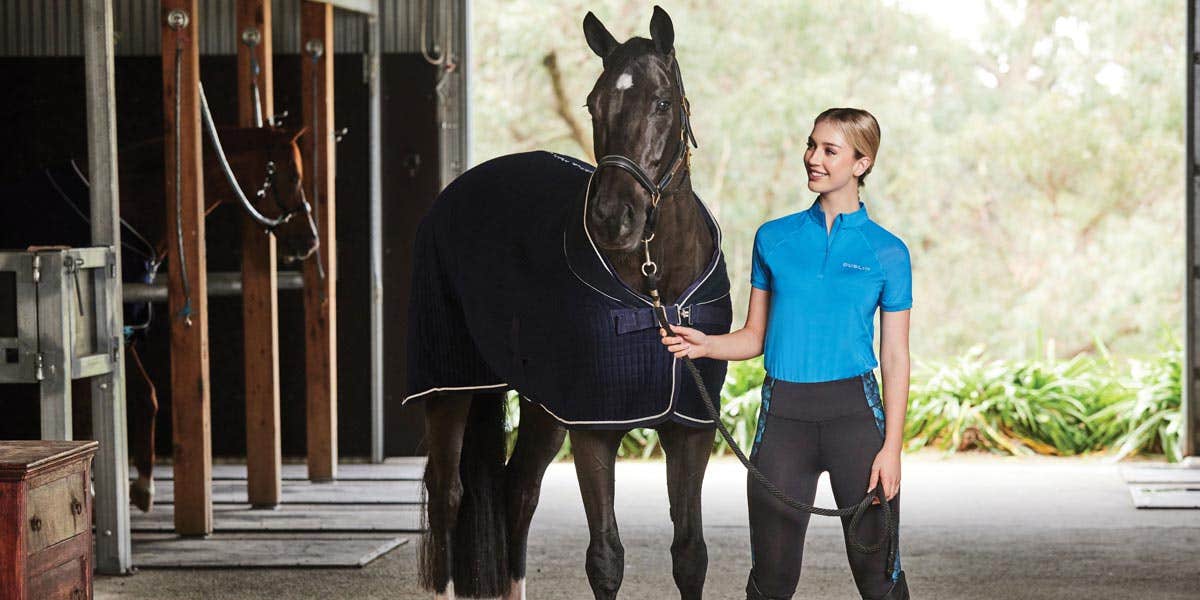5 mins


Horses are a lot of work, and unlike humans they can’t always help themselves. When owning horses, you have the responsibility to ensure their safety and well-being, so we’ve put together some key considerations to take into account to help your horse live a happy and healthy life.
1. Safe Paddock and Shelter
One of the most important things when owning a horse is ensuring they have a safe paddock with secure fencing and shelter. This may come in the form of trees or a purpose-built shelter. Although your fencing doesn’t have to be fancy, you want something sturdy that’s not going to fall or cause harm to your horse. Horses should have plenty of room to be able to trot around and cleaning up manure should be considered for smaller paddocks to optimize grazing room.
2. Fresh Water and Feed
Many horses survive just fine without additional feeding, but often horses will need additional feeding in colder seasons or dry conditions when pasture is limited. Feeding good quality hay is the first step in the right direction and should be the basis to your horse’s diet. If hay isn’t enough, grain can be added, with additional supplements to support your horse’s health. We’ve got a huge range of supplements which promote coat, bone and joint, muscle health and even reduce stress. Not every supplement is appropriate for every horse so be sure to consult your veterinarian with any specific health concerns.
Unlike feed, horses will always need access to water to help them keep hydrated. Ponies require at least 10-15 litres daily, whilst bigger horse require at least 25-30 litres daily. You can help ensure your horse reaches their daily water intake by supplying them water through water troughs, drinking tubs, automatic waterers or access to a dam. If you feel as though your horse isn’t drinking enough, supplements like Virbac Recharge and KER Drink-up which can help to entice a horse to drink and refuel their body with essential electrolytes.
3. Worming
Worming is an important aspect when owning a horse, as not worming can lead to serious illness. You should always consider a number of factors when it comes to worming like how many horses are kept close together, if they’re going on and off the property frequently as this can lead to needing greater worm control as they’re at higher risk of worm contamination. You should always refer to an equine veterinarian for any worming related questions, as over worming your horse can be just as bad of a problem as under worming them. We’ve got a huge range of wormers to target a huge variety of worms found in horses, and you can refer to our previous blog from Virbac which discusses 3 Steps To Get Your Adult Horse Deworming On Track.
4. Vaccinations
Horses, like humans, also need vaccinating against diseases! Vaccination is a way of stimulating a horse’s immune system to protect it against harmful organisms, such as bacteria or viruses without the horse being exposed to the risk of serious illness or death. Horseland stores stock the fabulous Zoetis Equivac 2 in 1 vaccine which protects your horse from both tetanus and strangles. You can learn more about vaccination your horse in our blog from Zoetis here: Infectious Diseases Can Kill: Why Take The Risk?
5. Hoof Health
Hoof health is another incredibly important aspect that needs to be taken into account when owning horses. Most horses will need their hooves to be trimmed or shod (the process of putting shoes on) every 4-6 weeks to ensure healthy hooves. Horses can get major infections in their hooves, like hoof abscesses, if they’re not tended to regularly. Just like human toe nails, horses hooves can grow too long and cause serious issues like lameness so must be kept in as best condition as possible. Some horses may need a little extra help with their hooves, that’s why we supply a huge range of hoof supplements to promote healthy hoof growth and repair cracks and other damage.
6. Dental Care
No matter if you ride your horse or not, horses need to see a dentist or equine vet at least once a year to have their teeth kept in top condition. Horse dentists will file down sharp teeth which can form hooks and sharp edges if left. Horses use their teeth to chew their food, so poor teeth can cause chewing problems which can lead to major health issues. If you’re riding your horse, you’ll most likely have a bit in your horse’s mouth regularly, so getting a dentist to do your horse’s teeth will keep riding comfortable.
7. Rugs
Rugging your horse is a major aspect to consider when owning horses. Keeping your horse comfortable and protected against the elements is important for their well-being and happiness. Rugging your horse in winter can help keep weight on them if they’re on the leaner side and protect them from the elements. Throughout summer, rugs can protect your horse from the harsh UV rays plus bugs and insects. As a horse owner you have the responsibility of ensuring your horse has the most suitable type of rug on in all different types of weather. From turnouts to mesh rugs, we stock a huge variety of rugs to keep your horse happy and healthy. You can read more about the types of rugs and when to use them in our blog: Types Of Horse Rugs And When To Use Them.
At Horseland we’re here to help care for your horse’s wellbeing and we offer all the essentials to keep your horse healthy and happy.Head into your local Horseland store or browse our range of horse health products online.

